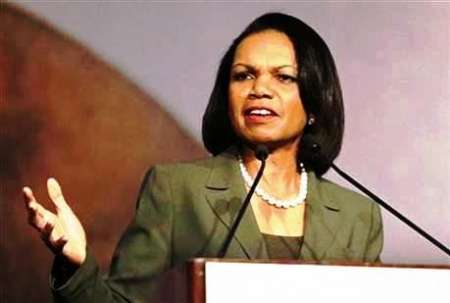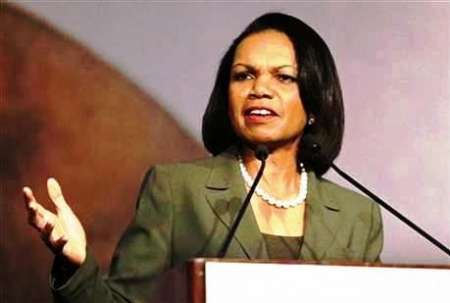 Tehran, Jan 17, IRNA -- Former US national security adviser Condoleezza Rice told jurors on Thursday she was stunned to learn that a classified mission to thwart Iran's nuclear program � now at the heart of a criminal leak trial � had been disclosed to a reporter.
Tehran, Jan 17, IRNA -- Former US national security adviser Condoleezza Rice told jurors on Thursday she was stunned to learn that a classified mission to thwart Iran's nuclear program � now at the heart of a criminal leak trial � had been disclosed to a reporter.Rice testified for the prosecution in US District Court at the trial of ex-CIA officer Jeffrey Sterling, 47, of O'Fallon, Missouri, who is charged with illegally disclosing details of the program to New York Times reporter James Risen. Sterling denies leaking any information to Risen, the Associated Press reported.
While Rice's testimony helped establish the importance of the classified program in question, her testimony did not implicate Sterling in any way as the leaker.
Prosecutors opted not to force Risen to testify about his sources after the reporter made clear he wouldn't divulge sources even under threat of a jail sentence for contempt of court. So they plan to introduce a package of circumstantial evidence to prove Sterling was the source, including evidence of phone calls and emails between the two.
Prosecutors say Sterling leaked the information out of anger because he felt mistreated within the CIA. Defense lawyers say the leak could have come from anywhere and that Sterling has faced unfair suspicion because he sued the CIA for racial discrimination.
In her testimony, Rice said the program was one of the most closely held operations during her tenure as national security adviser in the first term of President George W. Bush's administration. The plan called for using a Russian CIA asset nicknamed 'Merlin' to funnel deliberately flawed nuclear blueprints to Iran.
She said the classified operation 'was one of the only levers we had to try to disrupt Iran's nuclear program.'
The program was of such importance, she said, that she did something she never had done before: summon a New York Times editor to the White House and ask her not to publish the story. In the April 2003 meeting, which included then-CIA director George Tenet, Times editor Jill Abramson and Risen, Rice said she warned the paper that lives could be at risk if the story was published.
'I certainly understand the significance of the White House asking the New York Times not to run a story. I fully respect the role of the press,' Rice said. 'But I needed in this case to make sure that the New York Times understood the impact of what they were about to do.'
The Times agreed a few days after the meeting to kill the story. But Risen later published the story in a chapter of a 2006 book, 'State of War.'
Rice also disputed a central tenet of Risen's reporting � that the operation had been badly botched and that the Iranians had quickly discovered they'd been given faulty blueprints.
'I had been told just the opposite � that the program ... was indeed working. I had no reason to think that the Iranians knew anything about it,' Rice said.
By IRNA
The Iran Project is not responsible for the content of quoted articles.











